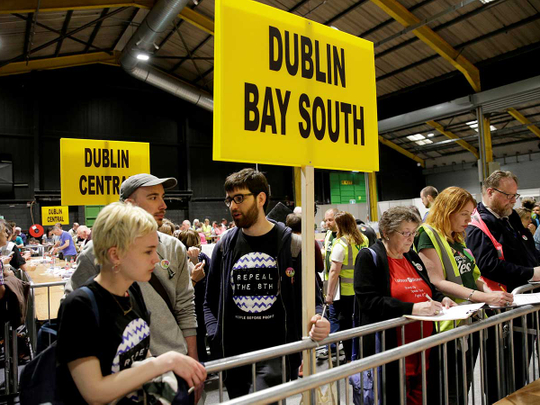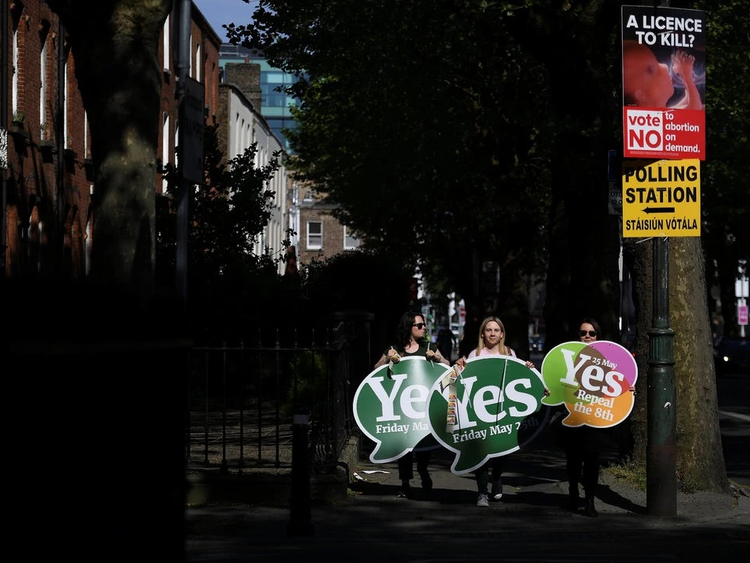
DUBLIN: Ireland is set to liberalise some of the world's most restrictive abortion laws after exit polls suggested a landslide vote for change in what was until recently one of Europe's most socially conservative countries.
As the vote count began on Saturday morning, the official LoveBoth campaign against liberalisation conceded that the polls painted "a bleak picture" for their efforts to retain a constitutional ban imposed in a 1983 referendum.
The campaign to repeal Ireland's strict abortion ban is expected to win the referendum by a two-thirds majority pic.twitter.com/kYWfs3j8gA
— AFP news agency (@AFP) May 26, 2018
"It's a Yes" read a banner front-page headline in the country's best-selling newspaper, the Irish Independent, which described it as "a massive moment in Ireland's social history".
An Irish Times/Ipsos MRBI exit poll suggested that voters in the once deeply Catholic nation had on Friday backed change by 68 percent to 32 percent.
An RTE/Behaviour & Attitudes survey put the margin at 69 percent to 31 percent.
What the voters were asked
Voters were asked if they wish to scrap a 1983 amendment to the constitution that gives an unborn child and its mother equal rights to life.
The consequent prohibition on abortion was partly lifted in 2013 for cases where the mother's life was in danger.
If confirmed, the outcome will be the latest milestone on a path of change for a country which only legalised divorce by a razor thin majority in 1995 before becoming the first in the world to adopt gay marriage by popular vote three years ago.
"It's looking like we will make history tomorrow," Prime Minister Leo Varadkar, who was in favour of change, said on Friday night on Twitter.
Vote-counting began at 0800 GMT (12 noon in the UAE) across the country on Saturday, with the first indication of results expected mid-morning. Campaigners for change, wearing "Repeal" jumpers and "Yes" badges, gathered at the main Dublin count centre, many in tears and hugging each other.
Battle in Parliament
A senator with the opposition Labour Party monitoring the count told Reuters that early tallies suggested the opinion polls were accurate.
"The exit poll I would say is bang on. We've done it," said Kevin Humphries, a former junior minister who campaigned for more access to abortion.
No social issue has divided Ireland's 4.8 million people as sharply as abortion, which was pushed up the political agenda by the death in 2012 of a 31-year-old Indian immigrant from a septic miscarriage after she was refused a termination.
Campaigners left flowers and candles at a large mural of the woman, Savita Halappanavar, in central Dublin.
The Irish Times exit poll showed overwhelming majorities in all age groups under 65 voted for change, including almost nine in every 10 voters under the age of 24.
The fiercely contested vote divided political parties, saw the once-mighty church take a back seat, with the campaign defined by women on both sides publicly describing their personal experiences of terminations.
Although not on the ballot paper, the "No" camp sought to seize on government plans to allow abortions with no restriction up to 12 weeks into a pregnancy if the referendum is carried, calling it a step too far for most voters.
The result is likely to be followed by a battle in parliament on how exactly access to abortion will be increased.
"We will hold the Taoiseach (prime minister) to his promise that repeal would only lead to abortion in very restrictive circumstances. He gave his word on this, now he must deliver on it," Dr Ruth Cullen, an anti-abortion campaigner with LoveBoth said.
The Eighth Amendment
The Eighth Amendment, which was voted into the Constitution by popular referendum in 1983, states that the life of a pregnant woman was equal to that of an unborn child. That meant, in practice, that abortion was strictly against the law.
In the years since, a series of high profile cases ignited debate.
In 1992, a 14-year-old rape victim was prevented from traveling to Britain for an abortion. After that, Irish voters passed a constitutional amendment that left the abortion ban intact but recognized a woman’s right to travel outside the country for an abortion.
The 2012 death of Savita Halappanavar, an Indian-born dentist living in Ireland, gave momentum to the current call for change. Dr. Halappanavar was admitted to a hospital while having a miscarriage.
Doctors told her the foetus would not survive, but because it still had a heartbeat, the medical staff initially denied her requests for an abortion.
By the time the foetus no longer had a heartbeat and was removed, Dr. Halappanavar had septicemia, an infection from which she died.
The church did not take a stand on the Eighth Amendment referendum or campaign on behalf of retaining it. Prominent Catholic organizations and theologians, however, have made their views known.
What comes next
If the vote favours repealing the Eighth Amendment, its current language would be replaced by the phrase: “Provision may be made by law for the regulation of termination of pregnancy.”
Draft legislation released before the referendum would allow for relatively unrestricted abortions up until 12 weeks of pregnancy, subject to consultation with a doctor and a short waiting period.
Beyond 12 weeks of pregnancy, termination would still be possible — up to 24 weeks — if two doctors determined that a woman’s life was threatened by the pregnancy or that there was serious risk to her health.
Regardless of the result of the vote, Irish women have obtained abortions by traveling to other countries or through the use of pills ordered online, and would continue to do so. Between 1980 and 2016, nearly 170,000 women traveled to Britain from Ireland to terminate pregnancies, according to statistics from Britain’s Department of Health.
Those who oppose the Eighth Amendment’s repeal said that women who travel abroad are going for what is essentially an elective procedure, and that a fetus should be protected under Irish law.
For many “yes” voters, it was about giving women the right to make their own choices, in their own country.
“We were told for so long what to do,” said Bernie Doyle, 79, who voted “yes” on Friday. “But now, give women the right to choose.”













